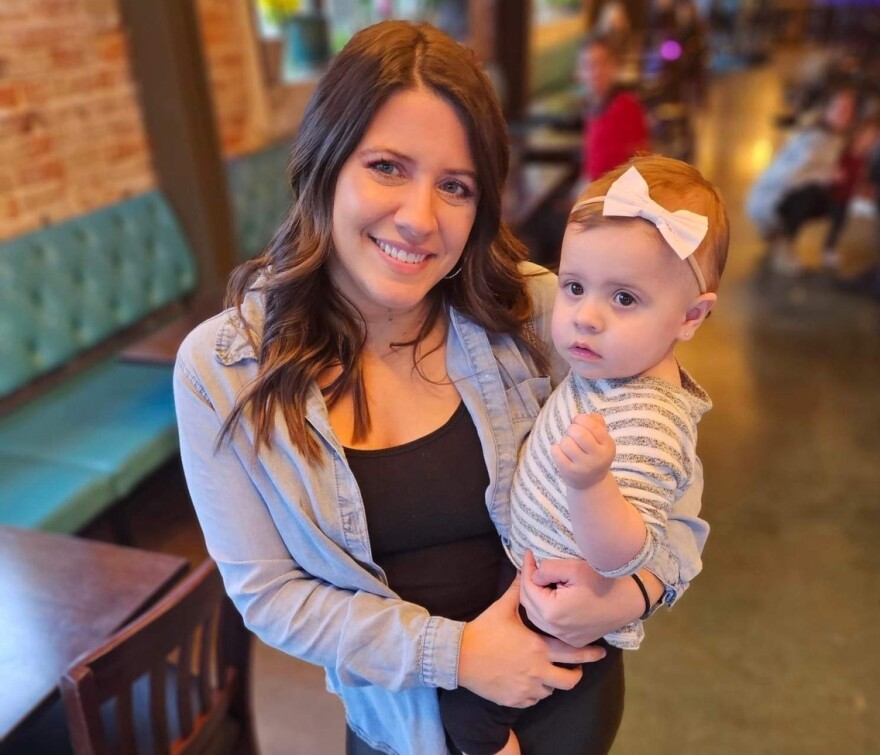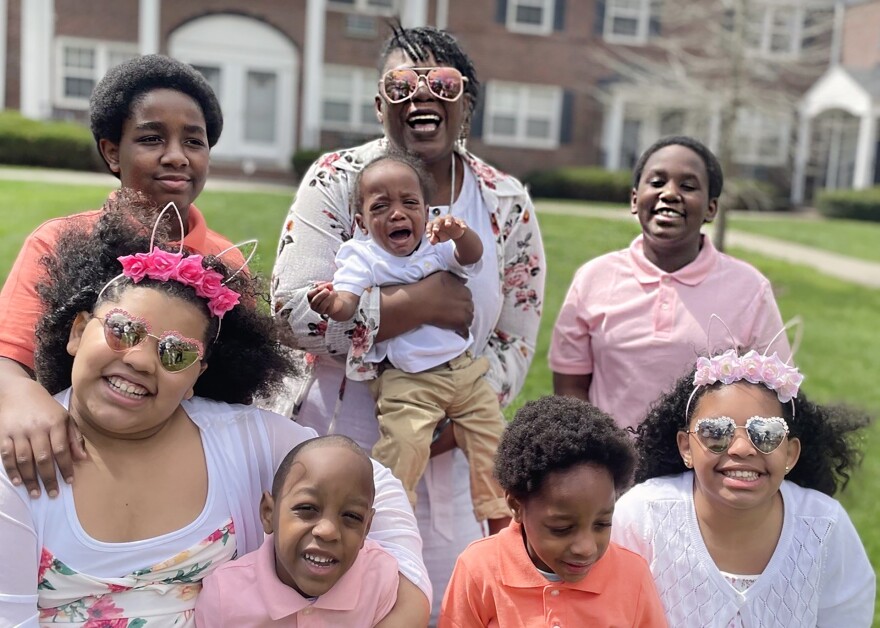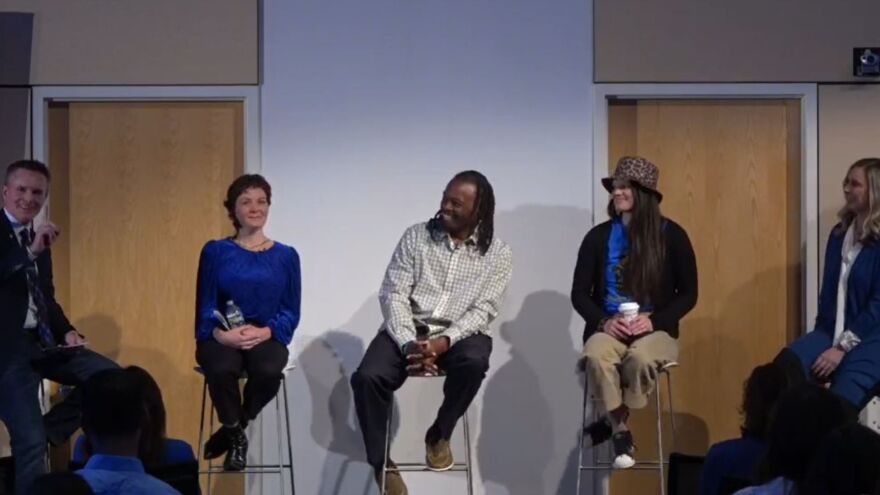UPPER SAUCON TWP., Pa. — March is Colorectal Cancer Awareness Month, and health care companies across the Lehigh Valley are providing information to the public about the leading cause of death in men and women under age 50.
At Olympus Corporation of the Americas, or OCA, in Center Valley this week, the widow of musician James Casey raised awareness about colon cancer a year after her husband did the same.
“It's a role that you fall into whether you're prepared for it or not."Ayla Cobb Casey, James Casey's widow
James Casey lost his battle with colorectal cancer in 2023. He was a saxophone player and member of the Trey Anastasio Band and toured with The Roots, John Legend, Megan Trainor, and other famous entertainers.
His widow, Ayla Cobb Casey, took the stage at Tuesday’s event, just as her husband did in 2023, to speak about her personal experience with being a caregiver to someone with this type of cancer.
“It's a role that you fall into whether you're prepared for it or not,” Ayla Casey said. “I wasn't prepared. It took me several months to figure out, but I wasn't OK.”
Ayla was joined by two people living with colorectal cancer, Deondre Williams, of Atlanta, and Rebecca Bixby, of Philadelphia.
Williams was diagnosed at 35 years old with stage II colon cancer, while Bixby was 40 when she was diagnosed with Stage IV rectal cancer and doctors found tumors on her lung.
Olympus Corp. of the Americas partnered with the Colorectal Cancer Alliance to share the stories of those battling the disease as part of its commitment to raising awareness around the issue of colorectal cancer prevention.
Marianne Pearson, senior director of patient navigation with the Colorectal Cancer Alliance, also joined the conversation to talk about the importance of knowing family history and getting routine screenings.
“A lot of people get diagnosed and they don't know what it means — it's just words," Pearson said. "They're scared out of their mind. They don't know what's going to happen.
“The alliance and navigators walk through the cancer continuum with caregivers or patients or friends or community members once a diagnosis happens.”
They also offer screening navigation, she said.
St. Luke's shares survivor stories
As Olympus held an event to mark Colorectal Cancer Awareness Month, St. Luke’s University Health Network is sharing the stories of some of its patients battling the form of cancer, as well.
JoAnne Farley, of New Jersey, was diagnosed by St. Luke’s with colorectal cancer when she was 30. Doctors credit early detection for giving her a chance at survival.
“The recommendation is for people to get their first colonoscopy at age 45, but any symptoms like changes in bowel habits, blood in the stool or abdominal pain need to be evaluated further with a colonoscopy, even at a younger age."Dr. Chatargy Kaza, gastroenterologist, St. Luke’s University Health Network
“Early detection proved invaluable for JoAnn’s success,” said Dr. Chatargy Kaza, a gastroenterologist with St. Luke’s University Health Network.
“Everything was taken care of in a very timely fashion so that our St. Luke’s surgeons were able to completely remove the cancer completely, and that’s the most important thing.
Kaza said colon cancer usually starts as a small tissue growth called a polyp. If they're discovered at a very early stage, they can be removed during a colonoscopy to prevent them from becoming cancerous.
Farley underwent a left hemicolectomy to remove part of the colon that had cancer and underwent two rounds of chemotherapy, as the cancer returned after the first round.

Today, Farley has no signs of disease. She has since been able to live a normal life and is the proud mother of a 2-year-old girl.
“My daughter is my miracle baby,” Farley said. “She was born two years to the day I rang the bell to finish my cancer treatment.”
Kaza said early detection gives patients the best fighting chance against colorectal cancer.
“The recommendation is for people to get their first colonoscopy at age 45, but any symptoms like changes in bowel habits, blood in the stool or abdominal pain need to be evaluated further with a colonoscopy, even at a younger age," he said.
"This is why it is so important to talk with your doctor about any changes and not ignore symptoms."
Knowing, recognizing signs
Doctors at St. Luke’s also stress the importance of knowing and recognizing the signs and symptoms of colorectal cancer, as some people, such as Crystal Hunter of Bethlehem, could mistake them for something else.
Hunter was diagnosed at age 49 with colon cancer after almost ignoring her symptoms.
She had a mild case of iron deficiency and took iron supplements, so when she experienced constipation, she blamed that.
"Colorectal cancer is one of the few cancers that we can prevent from developing into a more serious form. It’s the reason we recommend colon cancer screenings.St. Luke’s gastroenterologist Caitlin Foley
It wasn’t until she experienced rectal bleeding and had a colonoscopy that she realized it was something more. That procedure was performed by St. Luke’s gastroenterologist Caitlin Foley.
"Colorectal cancer is one of the few cancers that we can prevent from developing into a more serious form,” Foley said. “It’s the reason we recommend colon cancer screenings.
"Colon cancer starts as a precancerous polyp called an adenoma, and we can find them when they are very small and remove them during a colonoscopy so that they don’t get a chance to grow into cancer.”
Hunter had the cancer surgically removed and was treated with chemotherapy. She is considered cancer-free, but continues to get routine screenings.

“The biggest thing I would tell people is to take an active part in your health care,” Hunter said. “Be candid with your physician. Something you may not think is important may be a sign of a bigger problem.
"Dr. Foley was wonderful with me, and she pulled out information about me that I barely thought about. She allowed me to be myself.
"Even after my colonoscopy when the diagnosis came back, she was mindful of and attentive to my response. Her bedside manner is commendable.”
Colorectal cancer is the third most common cancer diagnosed in the United States, according to the American Cancer Society.
The recommendation for a person with average risk of colorectal cancer is to start regular screening at age 45, but those with a family history should start earlier.


